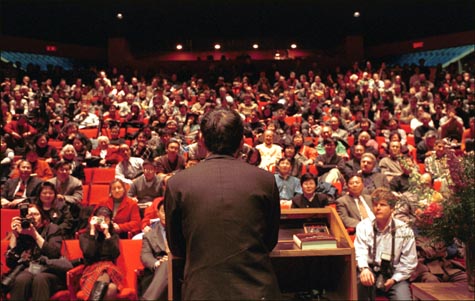Nobel winner affirms the ‘self’
Gao remains apolitical in his approach to the creative enterprise


He wrote in secret, at night. According to one biography, he “wrap[ped] his manuscripts in plastic and bur[ied] them in the earth floor under the heavy water urn in his hut.” At one point he was forced to burn “kilos and kilos” of manuscripts – burn them in secret, in fear for his life, a logistically maddening process of keeping a flame alight without creating any smoke that would give him away.
His days of fire without smoke are long gone. There could be no more telltale plume above Gao than the Nobel Prize in literature, which he received this past October. Gao, who has lived in exile in France for the past 14 years, is the first Chinese author to receive this honor. But despite the political circumstances that have shaped who he is, and continue to swirl about him (his books are banned in mainland China; the Chinese government, hearing about his Nobel, described his writing as “awful”; Swedish newspapers have grumbled about politics influencing his winning the prize), Gao remains apolitical in his approach to the creative enterprise.
“Not only do I not write to change society, but I feel an individual person could not do so anyway,” Gao said to a packed Science Center auditorium last Tuesday (Feb. 27) in a speech sponsored by the Harvard-Yenching Institute. Literature, he said in his Nobel acceptance speech, “is inherently man’s affirmation of the value of his own self. … Whether it has any impact on society comes after the completion of a work, and that impact certainly is not determined by the wishes of the writer.”
Author of plays (such as “Bus Stop,” “Wild Man,” “Signal Alarm”), criticism (“A Preliminary Discussion of the Art of Modern Fiction”), and novels (“Soul Mountain,” “One Man’s Bible”), some written in Chinese, some in French, Gao is known for his avant-garde approach to drama, influenced by such writers as Brecht, Beckett, and Ionesco. His novels are equally experimental. “Soul Mountain” moves among three narrative voices and incorporates Chinese fable, philosophizing, and history; it is semi-autobiographical fiction (based on a five-month journey around China taken when Gao fled authorities in the early ’80s) and feels like “one long poem,” says his translator Mabel Lee.
Questions of language interest Gao, and are evidence of his modernist, if not quite poststructuralist, sensibility.
“Writers express the human consciousness behind language, and human consciousness can only be expressed through language,” he said in his lecture, noting a built-in constraint of the writing process. Moreover, language accumulates cultural-semantic baggage over time, yet writers often use language as a tool to express ideas and feelings of the present.
Gao builds the auditory aspect of language into his creations. “I do find the musicality of language to be very important,” he told his audience last week. “Sometimes I find tonation, melody, to be more important than meaning.” Gao listens to music while he writes and often dictates first drafts into a tape recorder.
A painter as well as a writer, Gao has supported himself in Paris largely through sales of his abstract ink paintings. “Painting starts where words fail or are inadequate in expressing what one wants to express,” Gao said in a private interview. “Painting is purely visual. When I’m painting I try to dismiss all language. I just listen to music, I avoid all verbal associations.”
But since he won the Nobel, Gao hasn’t had much opportunity to write or paint. He seems weary, a little beleaguered by the endless traveling and speaking that has followed the announcement. The day he learned he won the prize, he couldn’t get to bed until 4 in the morning. At 6 a.m., reporters began ringing his doorbell. Over the next 48 hours, he got two hours of sleep. “If, for a period of time, I don’t have a chance to write, I feel very uncomfortable,” he said. “When I’m writing, I feel the external world doesn’t matter at all.”
Asked how he views his cultural identity, and whether he misses China, Gao gives a typically internal definition of self. “I am China,” he says, tapping his chest. Wo jiushi Zhongguo. “China is inside me, and that China,” he says, gesturing to encompass the world of politics and pain, of fallibility on a systematic scale, “has nothing to do with me.”




